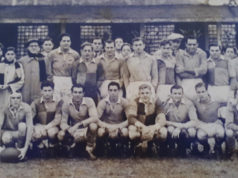Anthony McDaniel’s brief stay at the Presbyterian Night Shelter in Fort Worth this past winter was allegedly riddled with snarky remarks, bedbugs, roaches, rodents, and gross food.
None of these things are – sadly – unusual for a homeless shelter, but the result tends to be different when they happen to a guy who holds a master’s degree in public administration. In McDaniel’s case, he ended up writing a scathing and very detailed 35-page report that landed on the desks of city leaders and the U. S. Department of Housing and Urban Development (HUD).
McDaniel used his cell phone to document some of what he saw at the shelter. One of his photos shows a mouse looking up at him as he takes its picture. People are seen sleeping on the floor and in hallways of the shelter, just feet away from large puddles of water. Dust bunnies hang down from the pipes in the ceiling, and a cot has a row of used fast food cups stacked underneath it, an obvious magnet for pests.
McDaniel believes the shelter is exploiting and mistreating its clients, something that city and shelter administrators have denied. “What really bothers me the most is they’re collecting money in the name of homelessness, but it’s not being spent in the name of homelessness,” McDaniel told me. “I hate to see people capitalize on others’ misfortunes.”
A photo-collage in his PowerPoint presentation shows lunch trays filled with unappetizing globs of food. McDaniel alleges that on March 1, multiple guests at the shelter complained of being ill from eating one of the pasty-looking meals. He further alleges that a supervisor told them: “If you ain’t bleeding, you ain’t needing.”
For people living in dire poverty, the shelter is often the final buffer between a part-time place to stay and a harsh life on the streets. People arrive daily, hoping for a good caseworker and maybe a second – or a third or fourth or millionth – shot at a life with the bare basics a person needs to survive: food, water, and a safe place to sleep.
“About 1,000 people come through our doors every day,” said Toby Owen, the chief executive officer for the Presbyterian Night Shelter.
An increase in the homeless population led the city’s Directions Home program to give the shelter $101,626 to provide an additional 80 overflow beds for men from Sept. 1, 2018, through Feb. 28, 2019, according to documents.
No one –– not even McDaniel –– is suggesting the shelter’s job is an easy one, but more kindness and encouragement would go a long way, he said. McDaniel also believes the shelter needs to better manage its resources.
McDaniel raised dozens of concerns in his report. A tipping point for him came in March when he got into an argument with another shelter resident over a fan that was blowing in his face. The argument erupted after McDaniel snapped off the fan because he was battling an upper-respiratory infection. A staff member allegedly ordered him to go outside to cool off for 15 minutes. To make matters worse, McDaniel said he was forced to stand outside in 35-degree weather wearing just a T-shirt, shorts, and flip-flops.
The city’s rebuttal of McDaniel’s complaint maintains that the cool-off time is a gentler policy than banning people from the shelter for sparring with other clients.
The city became involved in investigating his complaint because it receives about $350,000 annually in HUD grants for the shelter, according to documents. The city has also contributed funding for major repairs, such as $40,000 for new heating, ventilation, and air-conditioning units in the men’s shelter in 2018, renovations for the women and children’s shelter in 2017 ($300,000), and $170,000 to upgrade restrooms in the men’s shelter in 2009.
Following McDaniel’s complaint, City Manager David Cooke met with Owen. Together, they drafted a report for Mayor Betsy Price and the city council that features more than a dozen responses to a variety of issues raised by McDaniel.
Owen said he was blindsided by McDaniel’s report.
“The first we heard about it is when we got a phone call from the city,” Owen said.
Regarding the roaches, rodents, and dust mites, it was noted that the shelter is cleaned daily from 8 a.m. to 10 a.m.
“Once a week. Terminex treats for bedbugs,” Cooke’s report states. “Once a week, Terminex treats for other bugs/rodents, and they come more often as needed. [Presbyterian Night Shelter] spent $12,000 on a heat room to kill bedbugs. On a quarterly basis, the shelter is closed all day to allow for a ‘deep clean.’ All clients and all their belongings must be out of the shelter temporarily for these deep cleanings. The most recent ‘deep clean’ was postponed last week due to rain.”
Much of the food donated to the shelter gets thrown away because it arrives past its expiration date, Cooke’s report states. McDaniel took photos of college volunteers who threw away at least three dumpsters full of food. He calls that poor stewardship of resources.
One of McDaniel’s complaints centered on the fact that overnight clients are not allowed to eat breakfast. “Overnight clients have access to dinner but not breakfast or lunch,” the city’s report states. “Clients participating in one of the ongoing [Presbyterian Night Shelter] self-sufficiency programs are provided all three meals, while overnight guests eat breakfast and lunch elsewhere.”
McDaniel believes the type of food that the night shelter is serving for breakfast should not break any budget.
“It’s not like they’re serving omelettes or something exquisite,” McDaniel said. “It’s grits and oatmeal.”
His allegations of mistreatment and rude comments from some of the staffers led to a promise of additional training for some employees.
As for the puddles of water, plans are underway to fix a leaky roof. And when people are found sleeping in the hallways, they’re promptly directed back into the bunkbeds, according to Cooke’s report.
The city’s Neighborhood Services Department, which monitors and inspects all homeless shelters that receive grant money, wrote in a March 29 letter to McDaniel that “results of the onsite physical inspection were very satisfactory, demonstrating a high degree of cleanliness with no health or safety hazards observed.”
The only repair that was noted and immediately fixed at the shelter was a broken plate cover on an electrical outlet. The letter also commended the city for immediately investigating McDaniel’s complaints. McDaniel still stands by his critique.
“They’re masters of damage control,” said McDaniel, who plans to take his case to the Fort Worth City Council again.
McDaniel said his entire experience at the shelter caused him to feel more despair at a time when he needed more hope and encouragement. The 52-year-old works as a substitute teacher in the Fort Worth school district and holds an Executive Master of Public Administration from Texas Southern University. A succession of events that landed him in the shelter began in 2017, when Hurricane Harvey roared up the Texas coast and devastated Port Arthur, his hometown. At the time, McDaniel was caring for his elderly mom, and the two decided to relocate to Fort Worth.
After arriving, they stayed in temporary housing funded by the Federal Emergency Management Agency. When that ended, the family found a house to rent, but the income McDaniel made by working as an Uber and Lyft driver was not enough to pay $1,800 in rent “and a $300 light bill,” he said.
His work for Uber and Lyft ended when another driver hit and totaled his car. Along the way, his mom decided to return to Port Arthur with a friend as McDaniel stayed here. “She’s 75-years-old and wanted to return to what’s familiar,” he said.
On the plus side, he recently moved to the nearby Salvation Army shelter, and things appear to be going well.
“The food there is great, and the staff is friendly and upbeat,” McDaniel said.
McDaniel sent me a picture of the dinner he had on Saturday at the Salvation Army. The meal included two chili dogs topped with cheese, an apple, fresh green and red grapes, and a bag of gluten-free potato chips. He said he viewed the good food as a signal of hope, an indicator that things will turn around and he can soon get back to really living instead of just surviving.













Teri Webster please contact me. I am a resident at PNS. This story barely scratches the surface of the abuses the residents be are subjected to.
Some contact me. The women’s shelter has no say in this article. The treatment for all People who stay there is abhorrent. I’ve been waiting for our (homeless population) voice to be heard. It’s much deeper than PNS. #OurVoicesNeedAHomeToo